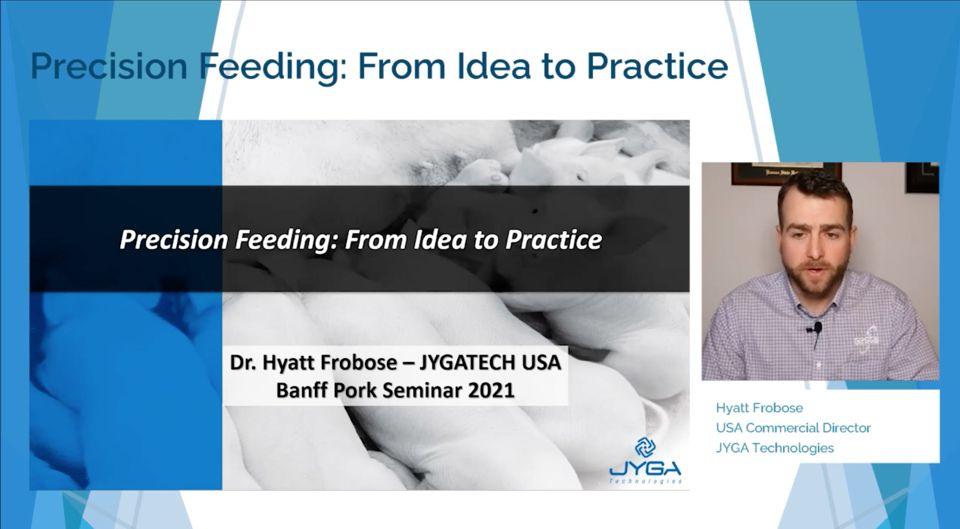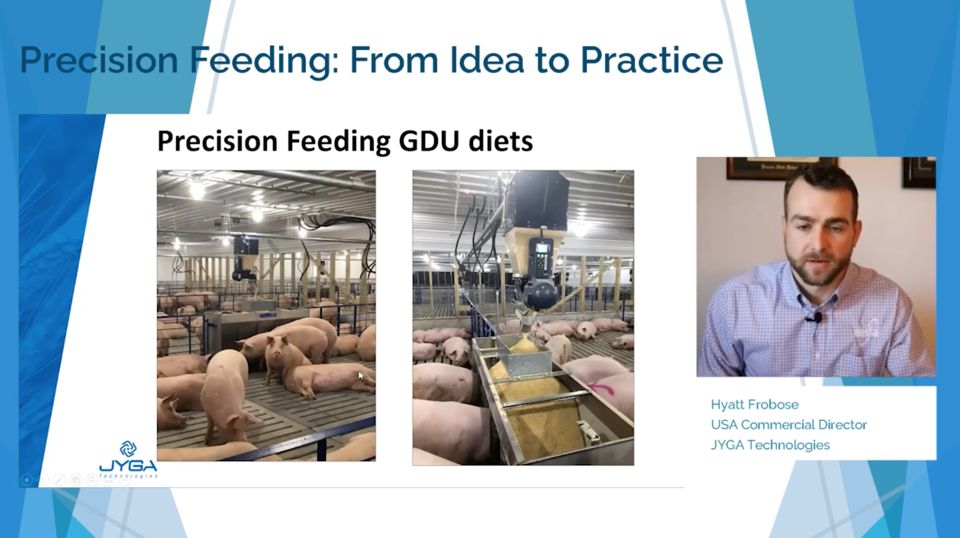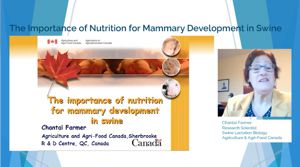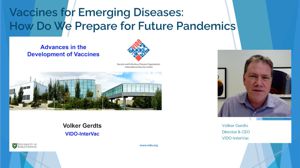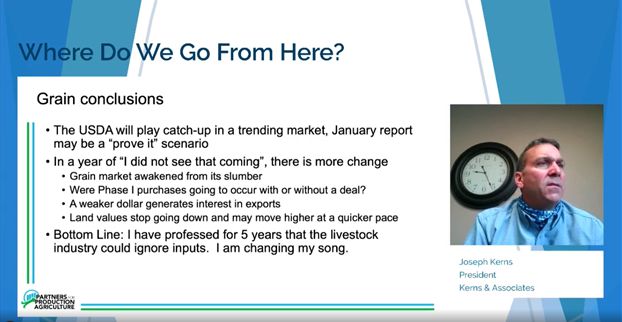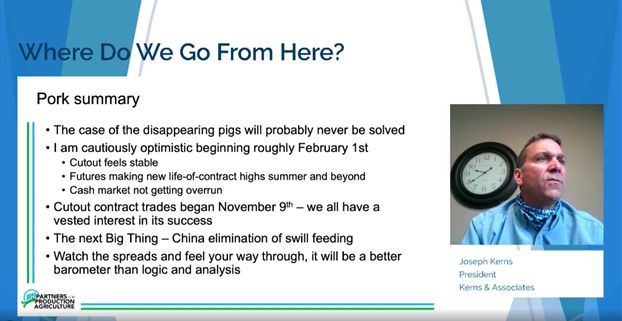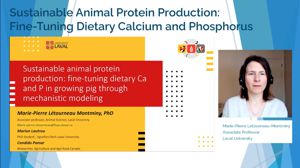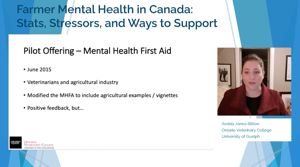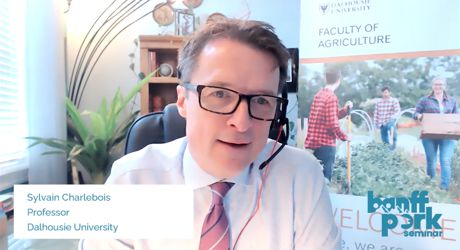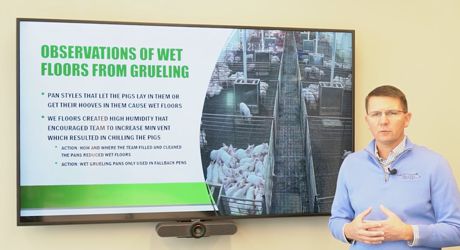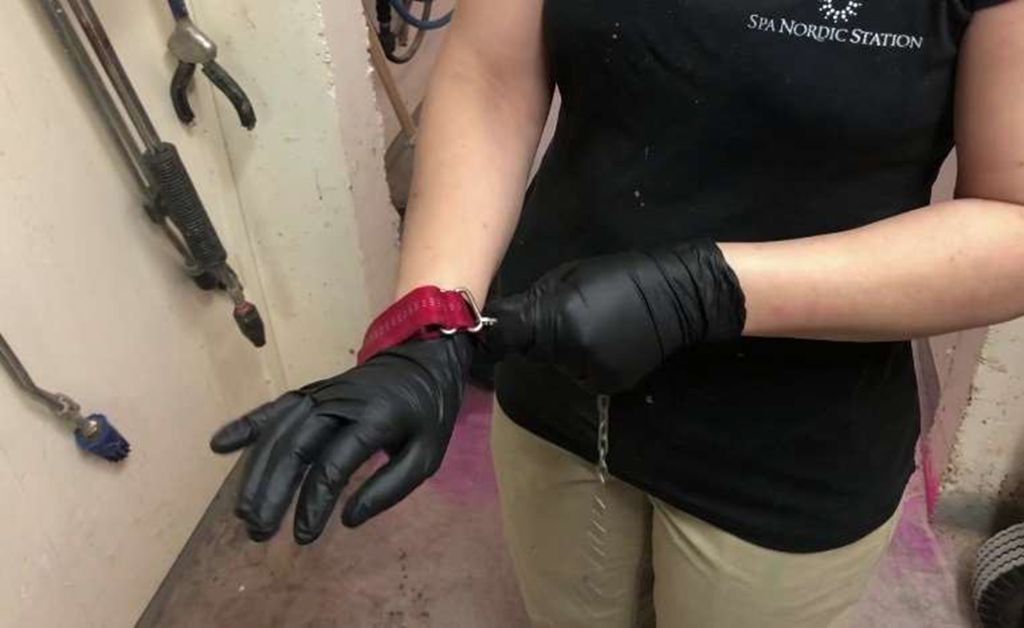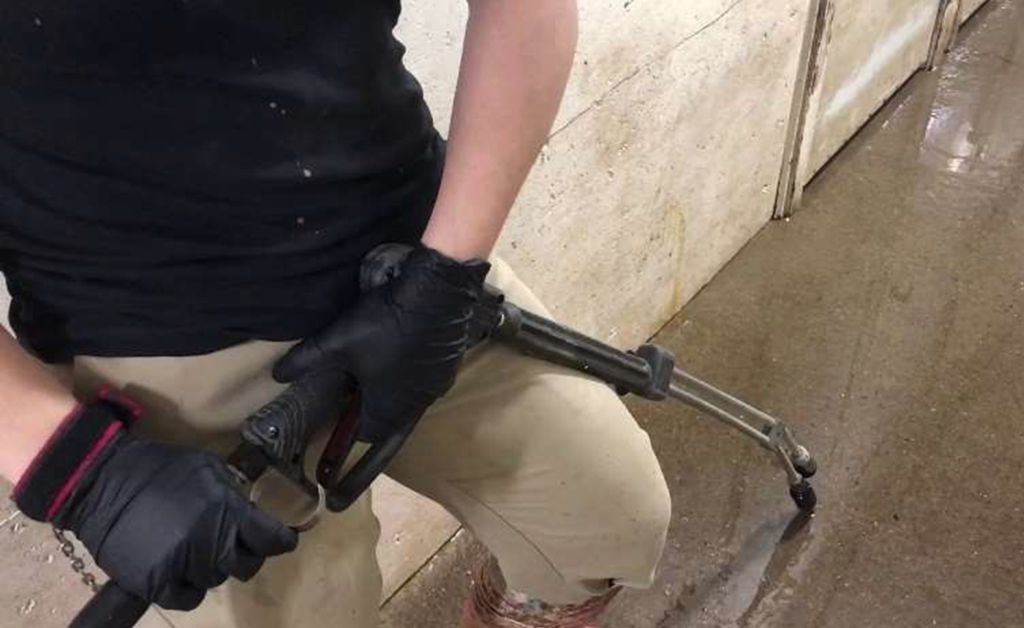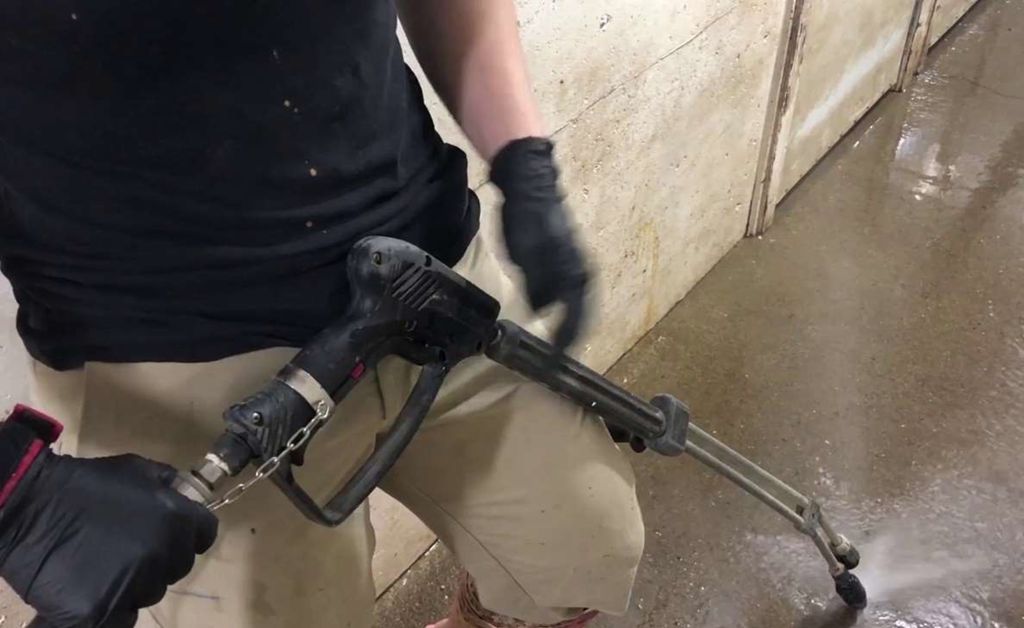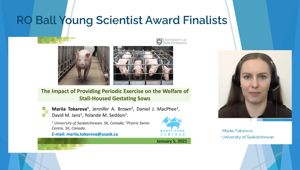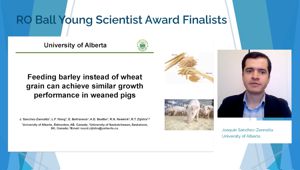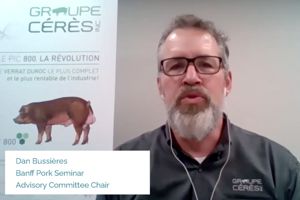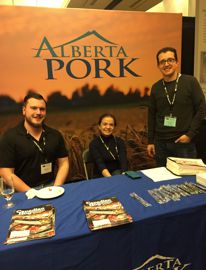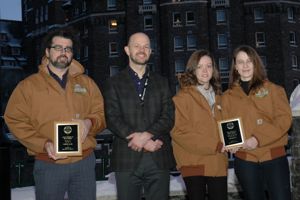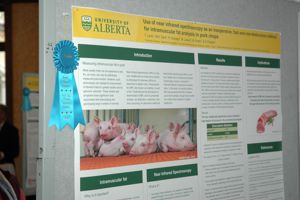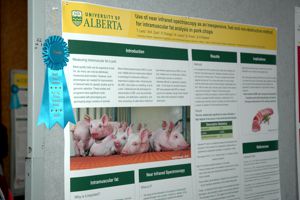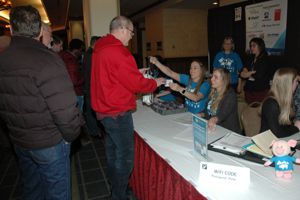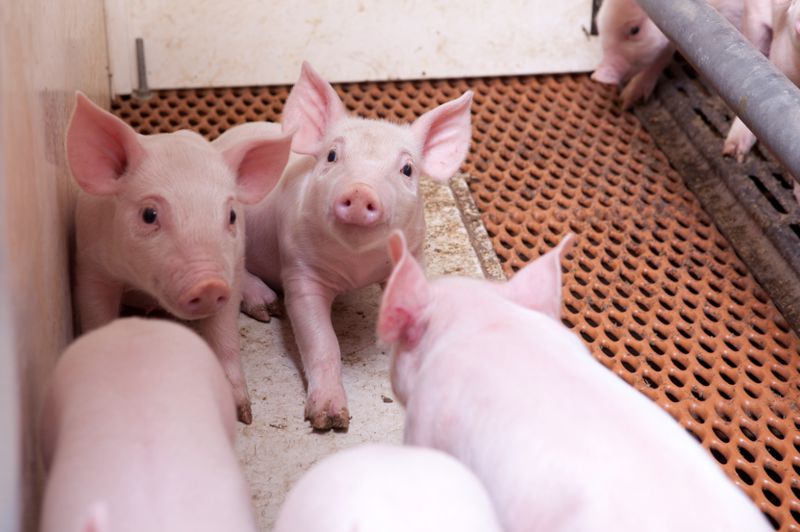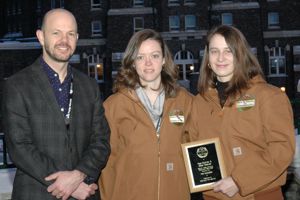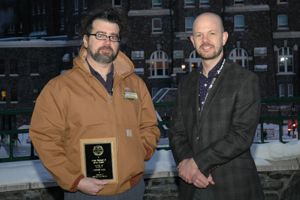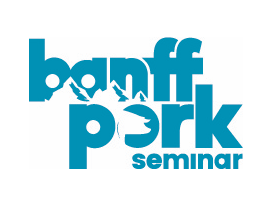Inside BPS Blog
News from the Meristem editors from inside the 2021 Banff Pork Seminar.
- Thanks for the support, see you next year
- The new power of precision feeding
- Pork industry playing catchup on sow milk production
- Bright spots on the vaccine horizon from VIDO
- Listen to the whispers in the marketplace to get through 2021
- Leading author shares tips for everyday resiliency in times of uncertainty
- Boosting pork sustainability: Fine-tuning calcium and phosphorous with modeling
- New mental health tools available for Canadian farmers
- Sylvain Charlebois: Pandemic helping rewrite food fundamentals
- Video cameras drive nursey barn management at Pillen Family Farms
- 2021 Aherne Prize winner: Safety bracelet for barn power washer
- Banff Pork Seminar 2021 student science winners announced
- The new normal in feed biosecurity for North American agriculture
- Chair Dan Bussieres talks "Resiliency in a New World" to open BPS 2021
- Message from Maximus: "Smart Systems in Pig Production"
- The annual last minute tips for BPS delegates
- Banff Pork Seminar 2021 proceedings will be available
- Virtual tradeshow a highlight at a free BPS 2021
- Feed biosecurity is changing: Learn how at BPS 2021
- BPS 2021 wraps up with popular Aherne Prize winner presentation
- Four free bonus "sponsor events" at Banff Pork Seminar 2021
- The big BPS social media opportunity: Use #banffpork
- Smart barns help Pillen Family Farms manage pigs better
- The people behind Banff Pork Seminar 2021
- Award winning psychology, education instructor on how to build resiliency
- Modeling can help fine-tune pork ration calcium and phosphorus
- Learn how to take precision feeding from idea to practice
- Media welcome but must register at Banff Pork Seminar 2021
- Student science award presentations wrap up Day 1 of BPS 2021
- Alberta Pork a Platinum Sponsor for BPS 2021
- Canadian research star Gerdts talks new vaccines and future pandemics
- How nutrition drives swine mammary development
- New information on producer mental health in Canada at BPS 2021
- Pork market watcher Joseph Kerns talks "Where do we go from here?"
- Food industry dynamo launches Banff Pork Seminar 2021
- Good reasons to register for Banff Pork Seminar 2021
- Call for poster abstracts: Deadline Oct. 31, 2020
- Registration now open for BPS 2021
- Free registration for BPS 2021, details in October
- Banff Pork Seminar's Aherne Prize entry deadline Oct. 31, 2020
- New BPS logo: Fresh look for fifty years
- Inside BPS: The place to find the latest on BPS 2021, Jan. 5 and Jan. 7
- It's official: Banff Pork Seminar 2021 goes virtual, Jan. 5 and Jan. 7
Thanks for the support, see you next year
Date posted: January 8, 2021
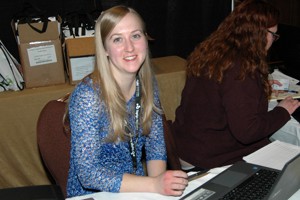
Ashley Steeple
Banff Pork Seminar (BPS) 2021 is wrapped up.
The official presentations are done but they will be viewed many more times in the days ahead by delegates and the expectation is that information will be discussed and shared many times. And judging by comments in the chat section, delegates are looking forward to what will be a special BPS in 2022.
BPS coordinator Ashley Steeple offers this quick wrap up of things for delegates to note as they head out the virtual door.
Presentations will be available. We will send all delegates a reminder email when presentations are available for revisiting. They will be accessible by using the conference app.
Tell us how we did. Help us make Banff Pork Seminar the best it can be by completing the conference evaluations. Accessible in the event app under survey section.
Tell your network. The blog items and feature articles on the Inside BPS Special Report are available free of charge for media and industry use. That report link is available from the home page of www.banffpork.ca.
Follow BPS on social media. Use the hashtag #banffpork to help tell the incredible stories our speakers have shared.
See you next year. We look forward to hopefully seeing everyone in person in beautiful Banff for our delayed 50th anniversary celebration. Mark your calendar for January 11-13, 2022.
The new power of precision feeding
Rapid growth in precision feeding technology in the pork industry is opening new doors for management approaches, new pathways to profit and a whole new area of research according to an industry player directly involved with it.
Hyatt Frobose of Jyga Technologies outlined his thoughts Jan. 7 to delegates to the 2021 Banff Pork Seminar (BPS) on how to take "Precision feeding from idea to practice".
There are many opportunities to re-think sow and gilt nutrition with the advent of new feeding technologies, he says. With numerous ways to benefit the individual animal, it is important for modern swine systems to approach these precision feeding systems with an open mind and weigh the cost-benefit equation to determine how to incorporate these newly available technologies into their operations.
Precision feeding means a much higher percentage of animals are fed what they need. Multiple feed lines and higher frequency of feeding options are just two of many ways to provide a more controlled feeding environment, he says.
Despite advances in research relating to the individual nutrient requirements of growing pigs and sows, swine nutritionists have traditionally been limited by infrastructure, logistic, and labor constraints within and between farms which have forced many systems to apply a 'one size fits all' approach to feeding strategies.
In recent years, new feeding technologies have entered the market which may circumvent many of the previous roadblocks by utilizing precision feeding concepts. Some of these concepts include diet blending, dosing micro-ingredients, machine learning, and timed feed delivery to match the daily needs of the individual pig more closely.
While many swine industry professionals continue to cling to the traditional feeding dogma used by producers in previous decades, progressive producers are finding ways to capitalize on these newly available technologies and successfully apply them at the slat level with success.
BPS 2021 delegates can revisit Frobose's presentation on the meeting platform app. It will be posted within a few days of the Seminar conclusion.
Pork industry playing catchup on sow milk production
Date posted: January 8, 2021
One of the real feathers in the cap for pork industry genetic improvement is the improvement in number of pigs per litter. One of the real problems is that milk production per sow has nowhere near kept up says a leading researcher in the field.
Chantal Farmer, with Agriculture and Agri-Food Canada, is an accomplished researcher in the area. She outlined in detail to delegates to the 2021 Banff Pork Seminar Jan. 7 the importance of nutrition for mammary development in swine.
Sow milk yield is the main determinant of piglet growth rate as milk is the only source of energy for suckling piglets, she says. However, sows do not produce enough milk to sustain optimal growth of their litter and this problem has been exacerbated with the current use of hyperprolific sow lines.
One crucial factor determining sow milking potential is the number of mammary cells that are present at the onset of lactation. So the industry needs to develop management practices that will enhance mammary development. Rapid mammary accretion occurs at three distinctive periods in the life of pigs and it is during these periods that nutritional strategies could be used to enhance mammary development.
Mammary development in swine can be altered by many factors, one of them being the nutritional strategy used in the prepubertal, gestation and lactation phases of production.
In growing gilts, feed restriction as of 90 days of age hinders mammary development and there are indications that supplying the phytoestrogen genistein from 90 days to puberty stimulates mammogenesis.
There are negative effects of overfeeding energy in gestation if it leads to obesity (36 mm backfat). Underfeeding in gestation leading to gilts being too thin (less than 16 mm backfat) also decreases mammary development on day 110 of gestation.
Mammary gland growth in lactation positively responds to increased protein and energy intakes indicating the importance of nutrient intake for mammary development. Litter size must also be taken into consideration as it affects mammary development and lysine needs are increased in a litter of six or more piglets.
Farmer says it is obvious from the current state of knowledge that much still remains to be learned in order to develop the best nutritional strategies for replacement gilts, gestating gilts and lactating sows in order to maximize their mammary development and lactation performance.
BPS 2021 delegates can revisit Farmer's presentation on the Seminar app. Presentations will be loaded within a couple of days of the end of the Seminar.
Bright spots on the vaccine horizon from VIDO
Date posted: January 8, 2021
At a time when the entire world has never been more focused vaccine development, one of Canada's leading researchers in the field had some positive words on the subject for delegates to the 2021 Banff Pork Seminar (BPS).
Volker Gerdts, the director and CEO of the Vaccine and Infectious Disease Organization (VIDO) in Saskatoon, Sask. gave BPS delegates a look in the window at the fast-paced world of modern vaccine development with his Jan. 5 virtual conference presentation.
VIDO has 45 years of history in the vaccine world and today is a leader in Canada and globally. The organization has produced 10 vaccines in that time, six of those world firsts. In the current environment the team is the first in Canada to isolate the COVID 19 virus and supply it to the network frantically working on the challenge. They are the first in Canada to establish the animal model and have a COVID vaccine candidate. It is about to go to human clinical trial early in 2021.
With Canada's largest biocontainment infrastructure VIDO can work with Level Three pathogens. COVID is one of those. African Swine Fever is another.
Gerdts explained his VIDO team focuses on animal health but also the interface of animal and human health.
Getting inside viruses
Viruses can spread in many ways but in order to replicate they need to get inside cells. They have mechanisms to do that so they can take over cell mechanisms and reproduce themselves. The VIDO vaccine strategy is to try and block this.
There are two main mechanism for all vaccines to accomplish this, says Gerdts. One is antibodies which neutralize the adherence to the cell. The other is T-cells, which are cells that kill other cells.
Emerging vaccine technology
Gerdts explained several different types of vaccine technology in this rapidly-evolving world.
- Live attenuated vaccines. Pathogen is attenuated, replicates; strong immune response but safety concern.
- Inactivated (killed) vaccines. Pathogen cannot replicate; safe but requires additional adjuvants.
- Recombinant (subunit) vaccines. Only part of a pathogen. Very safe but not very immunogenic, needs adjuvants, includes toxoid vaccines, conjugates vaccines etc.
- Vectored vaccines. Relies on viral or bacterial vector. Has the advantages of both live and inactivated vaccines. Immunity against vector can be a problem
- DNA and RNA vaccines. Novel technology; very effective in experimental animals but use in humans and animals not yet fully explored.
Listen to the whispers in the marketplace to get through 2021
Date posted: January 8, 2021
China. Drought. Pandemic. Political unrest.
Anyone trying to navigate the pork industry in 2021 will be better off listening to the whispers in the grain and livestock marketplace and simply working their way through than trying to follow hard and fast rules that may have gotten them through past years.
That's the advice veteran market analyst and enthusiastic speaker Joe Kerns, president of Kerns and Associates had Jan. 7 for delegates of the 2021 Banff Pork Seminar.
Kerns' presentation will be available for the 1,000 plus delegates to revisit on the meeting platform in the day or so following the Seminar presentation. It is rich in detail and worth viewing.
As a teaser, here is a peek at his key advice from the presentation for the grain market and for the livestock market.
Leading author shares tips for everyday resiliency in times of uncertainty
Date posted: January 8, 2021
She survived a harrowing, life-threatening experience as a teenager, crashing her car through an ice-covered water body. She fought her way to the surface that day and was rescued by a passer-by. She used that incredible experience to build a career in research on the subject of resiliency.
Robyne Hanley-Dafoe brought her story and her research to the 2021 Banff Pork Seminar. Her common sense tips and wisdom on how to survive challenging times with humour and resilience found a ready audience with delegates in a tough industry and in tough times.
Hanley-Dafoe kicked things off with a well-known quote from C.S Lewis "It's not the load you carry, it's the way you carry it" to demonstrate the power of a positive mindset.
When she was studying resilient people, she found a common denominator of five core traits:
- Belonging – having a home team
- Perspective – alignment of value system, head and heart
- Acceptance – persist, pivot or punt
- Hope – trust in the future; choose to be hope-filled
- Humour – laughter is the best form of release and recovery
Good things come in five's as Hanley-Dafoe's Micro-Habits for Wellness prove:
- Wellness is not all or nothing
- Self-care/ preservation is not optional
- Bookend your day – protect the first and last hour with time for your well-being
- Make a To-Do list (priorities for the day), a To-Be list (how you want to feel) and a Not-To-Do list (habits and practices to avoid)
- Connect with nature – science shows that time outdoors is essential for well-being
The full session will be available for all Banff Pork Seminar delegates to watch on the Seminar program app within a couple of days of the Seminar end.
Highly recommended viewing.
Boosting pork sustainability: Fine-tuning calcium and phosphorous with modeling
Date posted: January 8, 2021
If the livestock industry is going to remain competitive and sustainable it must take advantage of the power of data mining.
That was the message 2021 Banff Pork Seminar (BPS) delegates heard from Laval University researcher Marie-Pierre Letourneau-Montminy. She holds a Canada Research Chair position with a main research focus on producing sustainable animal protein, especially optimizing the utilization of phosphorus (P) and nitrogen (N) in pigs and poultry.
For animal protein production becoming universally accessible, affordable, and safe, basic research, data mining and process modelling must be applied, says Letourneau-Montminy. Mechanistic models can be used successfully to assess nutrient requirements and resource use by the livestock sector. The mechanistic approach developed to predict dietary Calcium (Ca) and P requirements for bone mineralization of growing pigs based on multiple criteria is promising to precisely estimate requirements by adapting to each context and precision feeding development.
The year 2019 was the 350th anniversary of the discovery of the element phosphorus, says Letourneau-Montminy. As a key component of DNA, all known metabolic energy systems, and gatekeeper of cells as phospholipids, phosphorus is an essential nutrient for all life forms. It is a non-renewable resource with no substitute.
The sustainability of animal production and of agriculture in general depends largely on its judicious use. In the bodies of vertebrates, about 60 percent of their phosphorus occurs in bone at a fixed ratio with calcium, while the remaining portion is found mainly in muscle. An adequate supply of phosphorus is therefore essential for animal growth, health, and wellbeing and this must be provided using efficient and sustainable means that minimize the phosphorus footprint of livestock production.
This implies precise estimation of the phosphorus content of feed ingredients, which has been the subject of many publications and recent methodological standardization. This has brought to light important factors determining phosphorus availability, namely its chemical form, calcium supply and the use of phytase.
Efficient utilization of potentially absorbable phosphorus implies precisely establishing the requirement; this is where it starts to get complicated. Indeed, there are multiple response criteria that can be used depending on the production objectives (e.g. profitability, animal welfare, and environment) and many practical indicators (e.g. growth performance, bone mineralization, excretion) making the concept of establishing a single requirement challenging.
Therefore, multi-criteria approaches should be identified to handle the complexity of the animal response to phosphorus and calcium. To meet the challenge of optimizing multiple livestock responses to dietary P and Ca (e.g., performance, health), mechanistic models have been developed and then inversed to predict requirement.
Letourneau-Montminy's presentation will be available for viewing by 2021 BPS delegates through the conference app.
New mental health tools available for Canadian farmers
Date posted: January 8, 2021
It will be no surprise to anyone who has worked in or around the agriculture sector that it can be a stressful life that can leave many struggling with mental health issues. And within the agriculture sector, mental health remains a difficult conversation to start and one that still has a stigma attached.
In her presentation for the Banff Pork Seminar 2021, Farmer Mental Health in Canada: Stats, Stressors, and Ways to Support, Andria Jones-Bitton of the Ontario Veterinary College shared the lessons learned from a multi-year research project that began in 2015.
More stress than the average Canadian
The project, which sought to remedy the lack of a comprehensive understanding of mental health issues in Canada's agricultural community, was completed in two phases. The first phase ran from 2015 to 2016; a survey delivered nationally had approximately 1,100 responses. The second phase included 75 one-on-one interviews between 2017 and 2018.
Not surprisingly, the overwhelming outcome was that those in the agriculture industry, compared with "normative data", had significantly lower resilience scores and higher levels of stress, anxiety and depression.
"There are five key stressors in the agriculture sector that contribute to the higher numbers we found as a result of our project," says Jones-Bitton. The key stressors are:
- Uncertainties – so many factors are out of an individual's control such as weather, marketing opportunities, government regulations and disease outbreaks
- Farm legacy pressure – the stress of failing to continue a multi-generational farm legacy
- Social pressures – small communities can provide great comfort and support, but there is also the feeling that nothing is private and of operating under a microscope
- All-encompassing dependency – the long hours and lack of weekends and vacations
- Public scrutiny – farmers today feel that everything they do is judged in a court of public opinion online and through social media; fears of on-farm activism
The results of this work were used as the foundation by a Stakeholder Working Group that included farmers, veterinarians, ag industry leaders and government representatives as well as mental health professionals. They developed two programs geared towards supporting better mental health solutions and outcomes for anyone involved in the Canadian agriculture sector; "In the Know" mental health literacy training program and the Emergency Response Model.
In the Know
The "In the Know" mental health training program is a four-hour, in-person workshop facilitated by mental health professionals who are also from an agriculture background. They work through topics such as: Mental illness and mental wellness; stress; depression; substance abuse; suicide; and resilience and coping.
Positive outcomes from these workshops include statistically significant increases in:
- Knowledge around mental health
- Confidence in recognizing mental health struggles
- Confidence in speaking about mental health with others
- Confidence in helping someone who may be struggling with mental health
These workshops will be delivered in partnership with provincial and national organizations such as Ontario Federation of Agriculture, Canadian Mental Health Coalition Ontario, Keystone Ag Producers (Manitoba) and are in discussions with AgSafe in Alberta among others.
Emergency Response Model
In agriculture a crisis can come in many forms. Disasters such as droughts or disease outbreaks can bring an entire sector to its knees and the individuals in the eye of the storm will need mental health support as much as financial and other supports. The Emergency Response Model is a guidance document that outlines evidence-informed recommendations to support farmer mental health during an agriculture crisis or disaster.
Three categories – prevention, intervention, recovery – are intended to help agriculture organizations, communities and governments provide better proactive, support to farmers and their families and communities while they are dealing with a crisis.
Prevention. This includes ag-specific mental health literacy training; easily accessible list of supports; farm and farmer insurance options; formal plan and ready access to resources; and ag specific mental health and resiliency training.
Intervention. Social support in the community; community education; peer-support and monitoring; 24/7 hotline and teleservices; free or subsidized supports; care for the entire family; personal advocates; trained advocates re: possible activism; ag-literacy training for service providers.
Recovery. Farm assistance/relief workers; child care assistance; improved access to mental health services - out of hours and teleservices; frequent reminders/encouragement for self-care; ongoing support (months not days); Ag specific mental health and resilience training.
Recommendations
There are clear action items for everyone in the sector according to Jones-Bitton. Governments have a crucial role; ensuring adequate supports for farmers are in place and deterring on-farm activism by increasing penalties for trespass, are just two examples.
She recommends individuals request the "In the Know" program through local farm organizations and ensure provincial governments are aware of the Emergency Response Model and build the infrastructures recommended.
"Advocating for ag-specific mental health literacy and resiliency training would be a way to encourage help-seeking among farmers and agriculture communities and thus decrease adverse mental health outcomes in Canadian agriculture communities."
Sylvain Charlebois: Pandemic helping rewrite food fundamentals
Date posted: January 7, 2021
He's known as the "food professor", an educator in food distribution and policy at Canada's Dalhousie University and senior director of the innovative Agri-Food Analytics Lab.
Sylvain Charlebois spends his days on "predictive analytics", looking at the future of food.
Many will know him from frequent mainstream media appearances. He is also one of the most cited people on the planet on food supply chain management, food value chains and traceability.
So when Charlebois brought his food message to the 2021 Banff Pork Seminar Jan. 5 in the middle of the global pandemic there was valuable information for the pork sector.
Legacies of COVID
Bottom line says Charlebois is that the pandemic is helping to rewrite the rules of the food industry across Canada and around the world. Pork producers are tough, he reminded his audience. They know the meaning of crisis, of riding the ups and downs of a cyclical industry.
Their challenge today is to read the changes coming in the food industry and prepare to capitalize on them. Here are key points he identified.
Consumer confidence. If the consumer is confident meat economics is not an issue, he says. A lot of people are fearful these days and food service and food retail has to help make people feel comfortable.
Pork can be well positioned because it is in middle ground, it is kind to people on a tight budget.
The fiscal sandwich. Expect meat prices to go up at retail in 2021 and that could create a "fiscal sandwich" when disposal income shrinks with increased taxation and loss or change of jobs.
Fewer nomads. One legacy of COVID is tele-commuting. People move out of cities, employers allow employees to work from home. So consumers are now less of a nomad, and don't stop for that coffee and don't go to the store or restaurants as much. They will stay home more.
More literate consumer. Gardening and cooking will drive a new, more literate consumer. One in five Canadians started a garden in 2020. They know Mother Nature is not perfect. People are also cooking more. They know more recipes and food alternatives, and are growing their own food.
A democratized supply chain. COVID completely changed the rules of the supply chain and made the line between retail and food service disappear. Everything is up for grabs and that won't change.
Farmer, processor, retailer or distributor all have direct access to the consumer by e-commerce. That sector grew by 4.5 percent in 2020; that's $10 billion worth of food.
Kraft Heinz opened a restaurant in Toronto. PC Chef is supplying meal kits where the restaurant experience can be completed at home. In last six months 65 percent of Canadians have ordered food online and 48 percent are thinking of ordering food online after the pandemic.
Grocers are investing billions of dollars to improve service online and improve delivery service. They will continue to get better. In most markets consumers can now order groceries and have them in a couple of hours. That was not possible before the pandemic.
Millennials and Generation Z will drive e-commerce. Farmers can get in on the action too. In the last six months of 2020 more people have bought food directly from farmers through online farmers markets.
The rise of plant protein. In 2020 meat became more expensive and history shows dramatic price increases can spook consumers. In 2014 for example, beef prices went up considerably and this was a major reason for the rise in veganism and plant based dieting.
Once you engrain the idea meat is expensive you have a problem. In 2020 more consumers looked at plant protein. Not all processed food, but things like lentils. As well plant based solutions are getting cheaper.
Getting adventurous with meats. The past year also saw a real move to specialty meats such as duck bison, rabbit and elk. Duck is up 22 percent, bison 197 percent.
Restaurants were closed and people saw prices were up so they said they might as well try something new.
Value added is really important for the pork industry. People love meat but they also love value. Pork has gained currency in the past few years.
Charlebois says "My generation cooked the heck out of it. It was not very good. Now we are better educated on how to handle pork. People are seeing how to prepare pork as a high value product."
Local food, partnerships will grow. Pork is produced in many areas and can capitalize on this trend. Economics of food will be rough for a while, but pork remains an affordable, accessible food protein that people love and know better. If you empower consumers to get more value from pork you will benefit.
Partnerships will be critical. Pork needs to get into people's homes and to do that producers need to partner with meal kits providers, grocers and restaurants so they can deliver a high quality product.
Video cameras drive nursey barn management at Pillen Family Farms
Date posted: January 7, 2021
Have you ever wondered what the nursery pigs' comfort is when caretakers are not able to be present in a barn 24/7?
Andy Jakubowski knows. The Director at Pillen Family Farms told the 2021 Banff Pork Seminar how that large hog operation in Columbus, Nebraska installed roughly 150 cameras in virtually all their nursery barns in the fall of 2017. It was so successful it anchors a new management era for the farm.
Here's an edited overview of his paper presented.
The background
The decision to install the cameras was driven by inconsistent performance across the nursery system. The health and age of the pigs were consistent, but the leadership and experience varied by site. Nursery barn designs in our business are hotel style with plastic floors. Each site was stocked with 12K-15K all-in all-out pigs, with each of the rooms having an inventory range from 700-1,800 head per room.
The footage from our cameras helped the leadership adjust environments, which translated into decreases in mortality and narrowed the gap between our site's inconsistent performance metrics. Through the process of viewing and analyzing camera footage the nursery system now better understands the following key areas that impact the success to managing the nursery pig:
- Pig stressors
- Drafting/chilling of pigs
- Adjustments to ventilation; and biosecurity
2021 Aherne Prize winner: Safety bracelet for barn power washer
Date posted: January 7, 2021
A Quebec pork industry employee, Martin Gosselin, of Saint-Isidore, Que. is the winner of the F X Aherne Prize for Innovative Pork Production at the 2021 Banff Pork Seminar. The award was presented Jan. 7, 2021 by Ben Willing, University of Alberta professor and chair of the awards committee.
Gosselin, who works with the Quebec based feed company Agri-Marche, won his award for an innovative "safety bracelet" grip control for power washers in the barn. Power washers require enormous force and the repetitive effort required by workers to control them can lead to a range of occupational health issues of the forearm for workers.
Typically these washing wands are controlled with some makeshift holders or not at all. Drawing from ideas he saw in the watercraft, snowmobile and cycling industry, Gosselin designed a grip that allows the worker to hold and fully control the trigger without undue strain. It also ensures its safe use by allowing easy shut down of the equipment.
"That simple but effective solution is a fitting winner for the Aherne Prize," says Willing. "This prize honours individuals who have developed either original solutions to pork production challenges or creative uses of known technology. Those grassroots inventions draw widespread interest because they make a real difference in production."
The invention
Here is a description of the invention in the words of the developer, Martin Gosselin.
We use cleaning machines with a pressure of 3,000 pounds. The trigger of the gun on this machine requires constant force from the hand and forearm to maintain and direct the stream of water. The constant maintenance of the necessary strength promotes the development of occupational diseases of the forearm such as carpal tunnel, tendonitis, epicondylitis or epitrochleitis.
In order to release the strain on the wrist and forearm, staff have developed a practice of locking the trigger in the engaged position with tape or a tie wrap.
This seemingly useful practice is not in accordance with the manufacturer's intended use. In addition, it is dangerous in the event of a loss of control of the rifle, particularly if there is an imbalance or fall of the worker or simply during the escape of the rifle.
Accidents with this method have resulted in tearing of equipment and severe injuries, including to the face of a worker.
Proper use of the pressure rifle presented a dilemma of either promoting the development of an occupational disease with permanent limitation, or exposing oneself to a risk of serious injury.
The essential need is to hold the trigger without undue strain on the worker, while maintaining control of the snap rifle at all times to ensure safe use. I drew a parallel between our problem and the use of a key to a personal watercraft or snowmobile attached to the user's wrist. The user maintains the starter key with continued ability to immediately shut down the equipment in a fall or loss of control situation.
Regarding the engagement or disengagement of the trigger, I had a distant memory of a trouser clip for cyclists. Thus, the combination of the key of a watercraft and this old memory of cyclists activated his creativity.
The first test was with a chain at one end he attached a hook-and-loop cat collar going around the wrist and at the other end he attached a metal plumbing collar as a hold-down for the gun trigger.
After a trial period of nearly four months by several workers, this retention tool now consists of a stronger strap on the wrist. A stronger and longer chain has replaced the initial chain. Finally the component of retainer has been folded back to give more strength.
Banff Pork Seminar 2021 student science winners announced
Date posted: January 7, 2021
The 2021 Banff Pork Seminar (BPS) has announced winners of the R. O. Ball Young Scientist Award.
This year's Seminar was a virtual one which meant changes in how the students participated. Instead of the normal in-person presentation, student presentations and the award presentation were virtual.
The award recognizes graduate students who provide a best overall combination of good and relevant science, well-written abstract and excellent presentation. It is named after Dr. Ron Ball, a former BPS program director and long-time researcher.
First prize in 2021 was awarded to Mariia Tokareva, University of Saskatchewan. Her paper was entitled "The Impact of Providing Periodic Exercise on the Welfare of Stall-Housed Gestating Sows.
Second prize went to Joaquin Sanchez-Zannatta, University of Alberta for his paper "Feeding Barley Instead of Wheat Grain Can Achieve Similar Growth Performance in Weaned Pigs."
First place winner receives a $500 cheque and plaque and second place receives a $250 cheque. Awards were presented by Ben Willing, chair of the BPS award committee.
The new normal in feed biosecurity for North American agriculture
Date posted: January 6, 2021
New research is showing that animal feed can carry major animal disease including African Swine Fever (ASF). Scott Dee, veterinarian and director of applied research for Minnesota-based Pipestone Veterinary Services gave the 2021 Banff Pork Seminar Jan. 5, an update on a rapidly changing world of feed biosecurity in North America.
The concept of animal feed as a previously overlooked risk factor came to light following the introduction of PEDV into U.S. swine herds in May 2013. Feed ingredients and prepared diets were not considered as potential vehicles for pathogen transport and transmission prior to that time, and no standard biosecurity practices were in place even though swine facilities frequently received new products and supplies on a daily or weekly basis.
The link between diet and disease transmission has raised concerns that U.S. herds could become infected with foreign pathogens through contaminated feed and feed ingredients originating from countries with endemic disease and lax sanitation and quality assurance procedures.
Feed can support viruses
Experimental data has already demonstrated that some feed ingredients, particularly soy-based products, can support the viability of at least three significant viral pathogens of swine (i.e., Classical Swine Fever or CSF, ASF, and PRV). ASF survival has been successfully confirmed in a total of nine distinct feed ingredients, including three soy-based products, choline chloride, three pet diets, pork sausage casings, and complete feed exported from China to the U.S.
Two key variables that influence the viability of viruses in feed include the specific virus's phenotypic properties and the feed matrix that is produced by certain feed ingredients and additives. Some matrices are more conducive to survival and can support several different viruses at the same time.
This discovery had added significance in 2018, when ASF was first isolated in Chinese swine herds. As the U.S. imports soy-based products from several ASFV-positive countries, it becomes important to quantify the amount and type of these products entering the U.S. and to identify at what seaports this importation occurs.
Chair Dan Bussieres talks "Resiliency in a New World" to open BPS 2021
Date posted: January 5, 2021
Welcome to all participants to the 2021 Banff Pork Seminar. This year marks the 50th year of the Banff Pork Seminar (BPS) and a lot has happened since we met last year in the beautiful Banff scenery. Who would have thought back then that we would have had such a year as 2020? Our world has changed dramatically with this Covid-19 pandemic. No wonder the advisory committee has selected "Resiliency in a New World" as the theme of this year conference.
Without any surprise we have had to adapt and go the virtual route for this year's event. We will miss for sure the social interaction, networking, good food and drink that make BPS such a great event. Our group has kept in mind the same objective which is to bring along great speakers and topics that we hope will bring value to all attendees.
In this crazy time, we are blessed to work in an industry that feeds people and has very strong roots into many communities. We are part of the essential service chain and throughout all the turmoil, the entire industry has kept working hard day to day in order to produce our pork. We likely all know people that have lost their jobs, business owners that have temporally closed their business and some owners for whom definitively closure become the only option. Our government is doing is best to help affected people, but the reality is that for a lot of them this won't be enough.
Our theme around resiliency could have easily applied to past years as our industry has faced many challenges over time and I'm sure it won't be over. Nevertheless, this new world has sent us some new curveballs with the labour issues on farm and in packing and processing plants.
In many countries slaughtering capacity has been affected which led in some cases to massive hold backs of pigs into the production system. As of mid-November 2020, in Quebec, we are experiencing our second wave of pig surplus with over 100,000 pigs in extra. Ontario is also facing some challenges. The USA has also seen a major step-back in processing capacity in mid-2020. Countries in Europe have also been greatly affected.
Our North American price has seen a tremendous dip during spring and summer. What will next year look like? Are we going to be able to come back to what we call a normal life? As I'm sitting here in my office, I really cannot tell. What I know though, is that our industry will keep fighting and working to put food on the table for millions of people.
The advisory committee has worked hard to put together a program for this new virtual Banff Pork Seminar. A great mix of technical, sessions along with sessions on the state of our industry and mental health and resilience. The seminar will be held over two days on January 5 and 7 and we made the decision to make it a free event for all participants. Thanks to the continuous support of our generous sponsors without whom the conference would not be possible.
We also need to acknowledge the work of Ashley Steeple, our BPS coordinator, as we have had to adapt to the new format and she has done a great job of keeping all of us in line during the planning of the event. Thanks to all our committee member for their involvement and especially to Michael Dyck and Ruurd Zijlstra our program directors.
To all participants, I wish you a warm welcome and I hope you will appreciate our program for this year's 2021 Banff Pork Seminar. We all hope to see you in person in 2022.
Message from Maximus: "Smart Systems in Pig Production"
Date posted: January 4, 2021
As pork producers look to the future, they have important decisions to make now about how to get ready for upcoming new technologies. Which barn control platform to adopt will be one of the critical success factors for future-proofing your production system. You will want to have a single system that can connect to or integrate with these new automation tools. The "brain in the barn" will become the single management and control platform for integrating all these new in-the-barn technologies.
And remember, these emerging high-tech trends are the beginning, not the end.
The data-tracking and alarm systems give you a direct line to your production. Software links you to your sites and barns 24 hours a day. You can check on the situation in the barn, no matter where you are. And, if necessary, you can adjust the settings in the control computers remotely to improve the processes in the barn. The result is a complete overview of your company and insight into production costs and technical results.
An integrated solution for today and tomorrow!
Doctor in Veterinary Medicine and Clinical Epidemiology, and Senior Strategic Advisor for Maximus Dr. Tom Stein is a world-leading expert and pioneer in modern swine industry.
Dr. Stein will be part of two free presentations by Maximus for Banff Pork Seminar delegates on Wednesday, Jan. 6, 2021. Details under the program button at www.banffpork.ca.
The annual last minute tips for BPS delegates
Date posted: December 21, 2020
Banff Pork Seminar (BPS) has a reputation for a vibrant learning experience and great fun in the Banff mountainside. The BPS 2021 virtual approach will be a little different but on the positive side delegates can stay safe and still enjoy top speakers the seminar attracts.
To make delegate experience the best it can be, here's a quick last-minute checklist for BPS attendees that that Seminar coordinator Ashley Steeple provides each year.
Registration is required. It's free for 2021 but delegates must be registered to view the presentations at BPS 2021 and access them on demand later. Best to do that before the event begins, Jan. 5.
Breakout sessions. As in past years the breakout sessions are concurrent. But unlike normal BPS in-person events, this year delegates can also watch sessions on-demand later if they wish.
Test drive the event log-in. You will be able to test drive the log-in a few days prior to the event. Always good idea to test that out.
If you have questions during the event. BPS and conference organizers will be set up to do their best to answer questions that may arise during the virtual event and will be available through the help desk in the event platform.
Proceedings available. A PDF of the 2021 proceedings will be provided to all registered delegates.
Find the latest news at the Inside BPS Special Report. Get news, photos and the Inside BPS blog in this Special Meeting Report from the 2021 Banff Pork Seminar, presented by communications partner Meristem. Find the special report link on the BPS website home page or directly on the www.meristem.com home page. Inside BPS Report articles are available with credit for reprint for individual, industry or media use.
Follow BPS on Twitter. Latest news will also be at @BanffPork. Help tell the pork story by using #Banffpork on all Tweets from the seminar.
Seminar evaluations. These are critically important to planning future BPS programs so please fill these out following the seminar. For 2021, the survey can be completed in the event platform.
Banff Pork Seminar 2021 proceedings will be available
Date posted: December 21, 2020
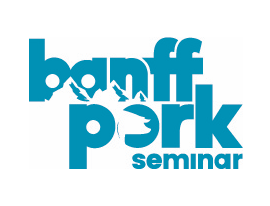
Banff Pork Seminar (BPS) proceedings are produced each year as the publication "Advances in Pork Production."
These are normally part of the Seminar registration package received at check-in. One question seminar coordinator Ashley Steeple has been getting is with a virtual conference format will the proceedings still be available?
The answer is yes. "Proceedings for 2021 will be available free of charge for registered delegates to download," says Steeple. "But you must be registered to access them."
Limited quantities of proceedings for previous years are available and can be requested by contacting the BPS office.
Virtual tradeshow a highlight at a free BPS 2021
Date posted: December 18, 2020
Every year sponsor support keeps the cost of attending Banff Pork Seminar (BPS) down dramatically for delegates. This year sponsors actually moved the needle to zero cost.
"With the global pandemic the only way to keep our delegates safe was to have a virtual event," says Ashley Steeple BPS coordinator. "Sponsor support helped us provide this for free."
BPS 2021 will have a new sponsor experience. When they login to the virtual event, delegates will see a virtual tradeshow area organized by sponsor category. Sponsors will have the opportunity to set up a virtual booth to talk directly to delegates.
"We are excited to offer this virtual tradeshow option," says Steeple. "One of the real benefits of attending BPS each year is the opportunity to network with industry representatives. This is a way to do that during the pandemic and stay safe at the same time."
The 2021 BPS sponsors are listed below in order of sponsorship category starting with the highest.
Platinum Sponsors
- Alberta Pork
- Maximus Systems
- Swine Innovation Porc
- Topigs Norsvin Canada Inc.
Gold Sponsors
- Alltech
- Cargill Animal Nutrition
- Dept AFNS, University of Alberta
- Fast Genetics
- Hypor
- Kemin
- Maple Leaf Foods
- Olymel S.E.C./L.P
Silver Sponsors
- Canadian Pork Council
- Carlo Genetics
- DNA Genetics
- DSM Nutritional Products
- DuPont
- HyLife Ltd.
- VIDO
Bronze Sponsors
- Agribution Canada Ltd.
- Alberta Barley
- APC
- Boehringer Ingelheim Animal Health Canada Inc.
- Canadian Bio-Systems
- Farm Credit Canada
- Hipra Animal Health
- Jefo
- Jyga Technologies
- Manitoba Pork
- Merck Animal Health
- Nutrition Partners
- Penner Farm Services
- Pestell Nutrition
- PIC
- Pillen Family Farms
- Prairie Hog Country
- Protekta Inc.
- Steve's Livestock Transport
- Sunterra Farms
- The Porc Show
- Zoetis
Feed biosecurity is changing: Learn how at BPS 2021
Date posted: December 14, 2020
COVID 19 is driving a world of change and Scott Dee is a good person to help the pork industry understand how the area of feed biosecurity will change and how it will affect all things pork.
Dee brings a world of knowledge to Banff Pork Seminar (BPS) 2021 in his Breakout Session presentation "Feed biosecurity: Past, present and future." It takes place Tuesday, Jan. 5.
"Feed biosecurity is always top of mind for people in the pork industry," says Michael Dyck, program co-chair for BPS 2021. "The world is dealing with COVID 19 now but challenges such as African Swine Fever and other diseases aren't going away. We still need to be looking at this and it will be even more sensitive because of COVID."
Dee brings a strong, practical and leading-edge background to his presentation, says Dyck. He is a board certified veterinary microbiologist and a past president of the American Association of Swine Veterinarians. After working at a swine practice for 12 years he served as a professor at the University of Minnesota College of Veterinary Medicine where he studied the transmission and biosecurity of PRRSV.
In 2011, Scott joined Pipestone Veterinary Services where he currently serves as Director of Pipestone Applied Research, a business unit that conducts collaborative research efforts with production companies across North America and Asia comprising approximately 2 million sows.
Anyone is welcome to view this presentation free of charge. However they must register for BPS 2021 to do that. Registration details are available at www.banffpork.ca.
BPS 2021 wraps up with popular Aherne Prize winner presentation
Date posted: December 14, 2020
It is a fan favorite of Banff Pork Seminar (BPS).
The F X Aherne Prize for Innovative Pork Production honors the best innovation in pork production. It will be worth sticking around for the end of BPS 2021 because the presentation from this year's Aherne winner wraps up the conference.
Researcher Ben Willing of the University of Alberta, who chairs the BPS awards selection committee, says the players who are eligible for the contest in many ways drive daily activity in the North American pork industry. They are, the owners, production managers, herdspeople, consultants and others involved in all aspects of the pork community.
"The innovations they enter cover the gamut of big, small, complex or simple," says Willing, "so they are of interest to a broad swath of players across all segments of the industry. "It's a nice prize as well," he adds. "Besides the recognition as an innovator by industry peers the 2021 winner will receive complimentary registration to the 2022 Seminar Jan. 11 to 13, 2022, accommodation at the world-renowned Fairmont Banff Springs Hotel and travel assistance, a value of approximately $2,000."
Delegates must be registered to catch this presentation. Details at the Seminar website www.banffpork.ca.
Four free bonus "sponsor events" at Banff Pork Seminar 2021
Date posted: December 11, 2020
Delegates signed up for Banff Pork Seminar (BPS) 2021, now have four new sponsor educational events available around the main Seminar.
"Over the years BPS has grown into Banff Pork Seminar week with many events scheduled around the main Seminar presentations and activities," says Ashley Steeple, BPS coordinator. "This year that continues but in a virtual format."
Here are the four Banff Pork Seminar Sponsor Sessions. All four events are free but registration is required. Note all session times are listed as Mountain Standard Time. Details and speaker information are available on the BPS website www.banffpork.ca.

Session 1. Tues., Jan. 5, 2021.
- Time: 12:00 p.m. – 1:00 p.m.
- Topic: Terminal Sires: Meeting Marketplace Demands.
- Speaker: Daniel Hamilton, PIC.
- Hosted by PIC.
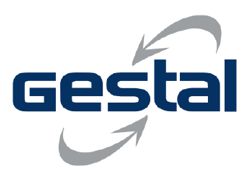
Session 2. Wed., Jan. 6, 2021.
- Time 8:00 a.m. – 9:00 am.
- Topic: Precision Feeding: A Modern Solution for Feeding to Individual Requirements & Capturing the Most Value in Your Operation.
- Speaker: Amanda Uitermarkt.
- Topic: Gestal: How It's Made.
- Speaker: Samuel Lefebvre.
- Hosted by Jyga Technologies.
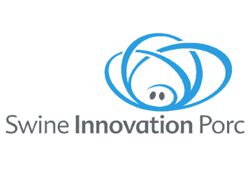
Session 3. Wed., Jan. 6, 2021.
- Time, 9:00 a.m. – 10:15 a.m.
- Topic: African Swine Fever: How is Canada Getting Prepared?
- Speaker: Six leading industry speakers.
- Hosted by Swine Innovation Porc.
- Note this event is not part of the BPS platform and attendees must register separately. Details here www.swineinnovationporc.ca.
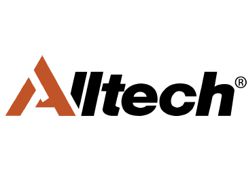
Session 4. Thurs. Jan. 7, 2021.
- Time, 11:30 a.m. – 12:30 p.m.
- Topic: New Rules Equals New Gut Health Strategies: A How-to Guide to Reduce Zinc in Starter Diets.
- Speaker: Aime Roy, Alltech
- Hosted By Alltech,
The big BPS social media opportunity: Use #banffpork
Date posted: December 11, 2020
There are lots of stories daily that showcase the power and lessons of social media. However, often the dramatic overpowers the pragmatic.
"Not every story is earth-shattering," says Annemarie Pederson who counsels agricultural organizations on the social media subject. "There is a real benefit to repeatedly, consistently telling your story of regular daily activities through social media."
The Banff Pork Seminar (BPS) is an incredible opportunity for the pork community to tell the story of modern pork production to their networks says Pedersen who is part of the BPS communication team for 2021.
"There may not always be breaking news announcements or dramatic scientific breakthroughs. But regular coverage of the pork community coming together around leading edge discussions is a great opportunity to make progress in telling the story to a broader audience.
"Even in 2021 when we cannot meet in person, every BPS delegate can help showcase the developments in this industry by following the Seminar @BanffPork on Twitter. The second way is to use share the discussions and highlights with your audience on Twitter using the hashtag #banffpork.
"The pragmatic side of this social media opportunity is that the hundreds of delegates represent thousands of Twitter connections. That is an opportunity to take people who are not able to attend the seminar inside the pork industry in a unique way."
Smart barns help Pillen Family Farms manage pigs better
Date posted: December 8, 2020
Practical and leading edge. Words that often don't fit together actually define how Andy Jakubowski and Pillen Family Farms manage their 71,000 farrow-to-finish hog operation at Columbus, NE.
Jakubowski brings his story of how smart technologies help Pillen Family Farms run their pig production business to Banff Pork Seminar 2021 Breakout Session on Thursday, Jan. 7. His presentation is entitled "Managing the nursery pig with the use of video cameras."
"We are really excited to have a successful hog operation using cameras and other technology to monitor animal behavior and feed intake," says Ruurd Zijlstra, program co-chair for BPS 2021.
"Andy Jakubowski has a great depth of real world experience in this area, he says. Over the past 25 years, he has served in various leadership roles encompassing all facets and of production, data analytics, and technology. And he has been on the front end of several innovative technologies and their applications while bringing a practical approach through his years of industry experience."
Delegates must be registered for BPS 2021 in order to take in this presentation. Registration is free. Details are available at www.banffpork.ca.
The people behind Banff Pork Seminar 2021
Date posted: December 8, 2020
Maintaining an iconic brand such as Banff Pork Seminar (BPS) through 50 years is always a challenge. This became an exponentially greater challenge for BPS 2021 with the arrival of the COVID 19 pandemic.
That's why the people on the organizing committee are an important resource in the BPS planning process. They bring experience from industry, government and academia across Canada.
The BPS 2021 Advisory Committee is as follows:
- Chair: Dan Bussières, Groupe Cérès Inc., Levis, Que
- Program co-chairs: Michael Dyck and Ruurd Zijlstra, University of Alberta, Edmonton, Alta.
- Conference coordinator: Ashley Steeple, University of Alberta, Edmonton, Alta.
- Eric Aubin, DNA Genetics, St-Lazare, Que.
- Javier Bahamon, Alberta Pork, Edmonton, Alta.
- Jason Brandt, Steve's Livestock Transport, Red Deer, Alta.
- Cliff Ehr, Olymel, Humboldt, Sask.
- Heather Ferguson, Cargill Animal Nutrition, Puslinch, Ont.
- Dawn Friesen, Fast Genetics, Spiritwood, Sask.
- Michel Larivière, PIC, St. Malo, Man.
- Frank Novak, Sunhaven Farms, Sherwood Park, Alta.
- Bryan Possberg, Polar Pork Farms, Loreburn, Sask.
- Leigh Rosengren, Rosengren Epidemiology Consulting, Midale, Sask.
- Greg Simpson, Hypor, Burgessville, Ont.
- Miranda Smit, Alberta Agriculture and Forestry, Edmonton, Alta.
- Ben Willing, University of Alberta, Edmonton, Alta.
BPS thanks these people for their contributions and would like to remind everyone that the Advisory Committee is an open process. Anyone interested in serving on it or learning more about its role is invited to contact a current member.
Award winning psychology, education instructor on how to build resiliency
Date posted: December 2, 2020
Resiliency is a word with new meaning these days. Delegates to Banff Pork Seminar (BPS) 2021 will hear from a leading speaker on the subject of how to build resiliency in people.
Robyne Hanley-Dafoe has won many awards as a psychology and education instructor for her work in resiliency, navigating stress and change and finding personal wellness in the workplace. She brings that experience to BPS 2021 in a Breakout Session on Tuesday, Jan. 5.
"When we discussed our program and selected our theme for this year, resiliency was a word that came up repeatedly," says Michael Dyck, program co-chair for BPS 2021. "We wanted to have a presentation to deal with the psychology of individuals, some of the HR considerations in identifying people but also in how we can support people so they can be as resilient as possible."
Described as transformational, engaging, and thought-provoking, Hanley-Dafoe's presentations provide practical strategies grounded in global research and case studies that help foster resiliency within ourselves and others.
As the senior educational developer for the Centre for Teaching and Learning at Trent University in Peterborough, Ont., she focuses on providing professional development for the teaching community and cultivating student engagement. Her work is inspired by her interest in resiliency and wellness including the intersections of stress, optimal challenge, navigating change, goal-setting, and personal alignment.
Delegates must be registered for BPS 2021 in order to hear Hanley-Dafoe's presentation. Details are available at www.banffpork.ca.
Modeling can help fine-tune pork ration calcium and phosphorus
Date posted: December 2, 2020
Nutrition drives profitability in the pork industry and each year Banff Pork Seminar (BPS) brings together speakers at the forefront of these developments.
One highly anticipated speaker at BPS 2021 is Marie-Pierre Letourneau-Montminy.
Her presentation on Thursday, Jan. 7 looks at sustainable animal protein production, specifically fine-tuning dietary calcium and phosphorus through modeling in swine.
"Letourneau-Montminy brings both a global and Canadian perspective to nutrition research," says Ruurd Zijlstra, program co-chair for BPS 2021. "She graduated from AgroParisTech in Paris, France and Laval University in Quebec with a PhD studying calcium and phosphorus metabolism in growing pigs and broilers using modeling and meta-analysis approaches.
"After completing a post-doctoral internship on precision feeding in pigs with Agriculture and Agri-Food Canada, Letourneau-Montminy built a research chair with several partners on alternative feeding strategies in pig and poultry in a context of sustainability at Laval University.
"Letourneau-Montminy now holds a Canada Research Chair position with a main research focus on producing sustainable animal protein especially optimizing the utilization of P and N in pigs and poultry. This is accomplished through understanding and quantifying the impact of factors related to the diet and to the animal through animal trials, meta-analysis and modelling to help formulate eco-friendly, healthy and low cost diets."
Letourneau-Montminy's presentation will be available to anyone who registers for BPS 2021. Registration details are available at www.banffpork.ca.
Learn how to take precision feeding from idea to practice
Date posted: November 29, 2020
The new world of precision feeding is opening opportunities in pig production globally. Anyone interested in taking the next steps in this area can learn from an expert at Banff Pork Seminar (BPS) 2021.
Hyatt Frobose with JYGA Technologies Inc., a Quebec based company providing precision feeding systems for the swine industry, gives BPS delegates a short course in taking "Precision feeding from idea to practice."
That BPS Breakout Session is on Thursday, Jan. 7.
"This company has increasing expertise in not just looking as feeding sows using smart technology in gestation but also in lactation," says Ruurd Zijlstra, program co-chair for BPS 2021.
"Hyatt is based out of Greeley, KS and is the USA director and nutritionist for JYGA. He specializes in assisting swine producers with group housing solutions and nutritional programs to optimize performance and welfare of gestating and lactating sows in commercial environments."
Delegates must be registered for BPS 2021 in order to take in this presentation. Details of this free event are available at www.banffpork.ca.
Media welcome but must register at Banff Pork Seminar 2021
Date posted: November 29, 2020

Each year Banff Pork Seminar (BPS) welcomes media to attend. In 2021, with a virtual seminar their experience like everyone else's will be different. Here are important details.
"As in past years media are asked to register to attend BPS 2021," says BPS coordinator Ashley Steeple. "It is more important this year because registration will be required to access the presentations during and following the event."
With the quality of speakers that BPS typically presents and the global nature of the pork industry, the seminar typically brings media interest from across Canada and internationally, says Steeple.
"We expect this year the Seminar may draw additional media interest because they can access these speakers without the time and cost to travel," she says. "The pork industry has made it clear that transparency and trust are important and media access is one simple way to reinforce that."
BPS has a special effort to assist media and industry communicators according to Steeple. The Inside BPS Special Report available by link from the BPS website www.banffpork.ca includes a blog, feature articles and photos. These are available for media support and industry use.
Direct contacts for assistance are available under the "Media Assistance" button on the Special Report page. Media can also follow BPS @BanffPork on Twitter.
Student science award presentations wrap up Day 1 of BPS 2021
Date posted: November 23, 2020
The R O Ball Young Scientist student competition is always a popular one at the Banff Pork Seminar (BPS) and typically many people crowd into the breakout session room each year to hear the next generation of industry innovators.
The 2021 seminar will present the same opportunity only in a virtual format.
"The top four young scientists will present their research on Tues. Jan. 5," explains Ashley Steeple. "A panel of industry representatives will judge these presentations and the winners will be announced on the morning of Thurs. Jan. 7, the second day of the Seminar."
Posters for all scientific presentations will be available during and following the Seminar, adds Steeple.
BPS registration is free but is required to view these presentations. Details at www.banffpork.ca.
Alberta Pork a Platinum Sponsor for BPS 2021
Date posted: November 23, 2020
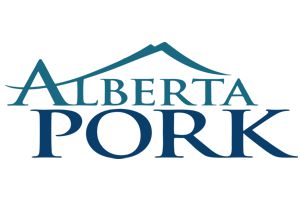
Alberta Pork is excited to once again sponsor the Banff Pork Seminar.
We are a non-profit organization representing the province's more than 900 registered hog producers before government, industry partners, media, the general public and other interest groups. Our producers' tireless efforts have been the driving force behind the pork industry for more than half a century. While the industry continues to face many challenges, Alberta's farmers are stepping up.
We would also like to recognize the many processors, researchers, veterinarians, transporters, retailers and everyone who supports the entire pork value chain. Because of you, Albertans, Canadians and consumers around the world are privileged to enjoy the highest-quality, best-tasting pork.
We hope you enjoy the 2021 Banff Pork Seminar!
Canadian research star Gerdts talks new vaccines and future pandemics
Date posted: November 19, 2020
One of Canada's leading researchers in vaccine development will bring his knowledge to Banff Pork Seminar (BPS) 2021. His presentation could not be timelier.
Volker Gerdts is director and CEO of the Vaccine and Infectious Disease Organization (VIDO-InterVac) in Saskatoon, Sask. That organization is at the leading edge of many projects, including being part of a team developing new options for COVID 19 vaccines in Canada.
"The idea of a pandemic is something we have always had in the back of our mind as a topic at Banff Pork Seminar for a number of years," says Michael Dyck, program co-chair for BPS 2021. "Now as we plan for BPS 2021 everyone is experiencing one."
In the Breakout Session on Tuesday, Jan. 5, Gerdts' presentation will focus on "Vaccines for emerging diseases: How do we prepare for future pandemics."
Gerdts' research interests are in the area of neonatal vaccines for humans and animals, mucosal immunology, as well as vaccine delivery and formulation. Current research is focused on COVID 19 vaccine development, novel adjuvants, PEDv and PRRSV vaccine development, the use of pigs as a model for humans, immune modulation and regulation of mucosal immune responses.
"Few people are better positioned to speak on this subject than Dr. Gerdts," says Dyck, "and it is nice to have those skills based in Canada."
How nutrition drives swine mammary development
Date posted: November 19, 2020
Banff Pork Seminar (BPS) is always a great place to get an update on the latest production research. BPS 2021 is the place to learn how sow nutrition lays the basis for swine mammary development.
"Chantal Farmer is a researcher with tremendous expertise in lactation and also how we can use nutrition to stimulate lactation so we get better development of the mammary glands," says Ruurd Zijlstra, program co-chair for the seminar.
Farmer, a researcher with Agriculture and Agri-Food Canada, has spent a career in the sow lactation biology area. Her BPS 2021 Breakout Session presentation Thursday, Jan. 7 is entitled "The importance of nutrition for mammary gland development in swine."
"It will cover her latest research and her knowledge in this area, which is extensive," says Zijlstra.
Her research goal is to increase sow milk yield and in the process, piglet growth. She was a pioneer in studying mammary development in gilts and sows and identifying factors affecting it. She has published 153 scientific manuscripts, seven book chapters, and is the sole editor of a recently published book entitled 'The gestating and lactating sow' that was also translated and published in Chinese.
Delegates must be registered for BPS 2021 to view Farmer's presentation. Details at www.banffpork.ca.
New information on producer mental health in Canada at BPS 2021
Date posted: November 16, 2020
Research from the Ontario Veterinary College being presented at Banff Pork Seminar (BPS) 2021 should be helpful in understanding mental health of producers and the best ways to provide support.
Andria Jones-Bitton will explain the latest research in her Tuesday Jan. 5 Breakout Session presentation entitled "Farmer mental health in Canada: Stats, stressors and ways to support."
Bitton-Jones is an associate professor in the Department of Population Medicine and director of well-being programming at the Ontario Veterinary College. Her research centers on epidemiology of mental health and resilience in the veterinary and agricultural sectors.
"Mental health is something we started looking at a few years ago with the outbreak of PED in the swine industry," says Michael Dyck, program co-chair for BPS 2021. "The impact that PED going through a herd had on producers was significant, particularly when they were euthanizing hundreds and hundreds of piglets.
"Now we are in a time of extreme uncertainty and we wanted to look at what are some of the considerations, and what are the impacts we are seeing from COVID 19 on the mental health of the producers.
"Andria's work is welcome fresh information on the mental health subject," he says. "It is nice to see that we now have veterinary epidemiologists in Canada doing work not just looking at the animals and the spread of disease within animal population, but what the impact is on the producers; what the stressors are and some of the best ways to help."
Delegates must be registered for BPS 2021 in order to hear Bitton-Jones' presentation. Details are available at www.banffpork.ca.
Pork market watcher Joseph Kerns talks "Where do we go from here?"
Date posted: November 16, 2020
Thrive and prosper.
Those may not be the first words that come to mind when pork production is discussed these days, but they are words that drive Joseph Kerns. The president of Kerns and Associates will open the Banff Pork Seminar (BPS) 2021 final day with his plenary presentation "Where do we go from here?"
"Kerns is an excellent speaker who has been to BPS before and comes highly recommended by those audiences," says Ruurd Zijlstra, program co-chair for BPS 2021. "In his business he leads a team of professionals with the express purpose of understanding the financial parameters around agricultural markets so that those he works with can thrive and prosper."
His presentation will look at the biggest issue today, how COVID 19 impacts the pork industry, says Zijlstra. That will include a look at how the personnel pressure at slaughter plants is causing tremendous upset in the pork supply chain, how that has been alleviated over time and what that means in terms of control of management systems.
"Much is happening with African Swine Fever around the world," he says. "While it seems to be less of an issue in China it is now popping up in Europe. German pork markets for example have been affected significantly."
Kerns is expected to look at what is happening in the markets on the protein side. With increasing pull from China for soybean meal, feed protein prices are going up. Other factors in the market mix are reduced pork supply due to problems in China.
"Another thing we have seen happening in the past few months has been that the organizations that have made the best use of these opportunities have been the slaughter plants and pork marketing organizations," says Zijlstra.
"Pig prices have still stayed low in Western Canada even though they are starting to increase now there is still a tremendous gap between pork prices in the grocery store and pig prices for our producers. That issue continues to play out."
To view Kerns presentation delegates must be registered for BPS. Details are at www.banffpork.ca.
Food industry dynamo launches Banff Pork Seminar 2021
Date posted: November 9, 2020
In the world of surfing they call it catching a wave. It is a clear metaphor, a description that everyone understands, the timing that takes and the energy that results.
Few people in Canada's food industry would be better positioned to understand the waves of change sweeping over their world than Dr. Sylvain Charlebois. He is a Dalhousie University professor in food distribution and policy in the faculties of Management and Agriculture. He is also the senior director of the Agri-Food Analytics Lab located at the university.
That knowledge and energy has resulted in him being a frequent speaker and regular contributor to mainstream media outlets across North America. Known as the "Food Professor" he is the author of five books on global food systems and one of the world's most cited scholars in food chain supply management.
He is involved with broad research initiatives globally including work with companies and organizations in Canada and development settings. He has been asked to act as an advisor on food and agricultural policies in many Canadian provinces, in the United States, Brazil, Austria, Italy, France, Belgium, China, Great Britain, Finland and the Netherlands.
"We wanted someone with broad appeal across the delegates," says Michael Dyck, BPS 2021 program co-chair. "Sylvain Charlebois is dynamic in the way he investigates and the way he presents this information. This is our chance to get information specific to the pork industry.
"His presentation to open our seminar Tuesday, Jan. 5 will be a conversation starter for the entire event and we suspect one revisited following the event."
BPS 2021 runs Jan. 5 and Jan. 7, 2021. There is no charge for attending but delegates must be registered to attend. Details at the Seminar website www.banffpork.ca.
Good reasons to register for Banff Pork Seminar 2021
Date posted: November 9, 2020
In day upon day of business and personal uncertainty in 2020 there is more reason than ever to be directly connected to the latest developments. For the pork industry, learning the latest has always meant attending the Banff Pork Seminar (BPS). This upcoming seminar adds new meaning to that.
BPS 2021 program co-chairs Michael Dyck and Ruurd Zijlstra have been involved in the organizational side of the seminar for many years. Neither anticipated they would face the world that the COVID 19 pandemic has delivered.
However, both believe this new reality means a unique opportunity for BPS delegates this coming year. In fact perhaps more than ever BPS is a must attend event.
These are their top reasons to attend BPS 2021.
It's free. "When the pandemic hit and we were forced to consider how we would adapt for BPS 2021, we made the decision that we wanted to keep the conference alive," says Zijlstra. "Then we quickly made the decision to make it as easy as possible to participate.
"That meant making it available free of charge for delegates."
"In many ways this is an opportunity as well as a challenge," says Dyck. "People who have never had the chance to attend our Seminar can now attend and have some of the experience at no cost. We expect broad interest from many new audiences around the world as a result."
It's compact. "Our organizing committee was clear they wanted to have the same high quality speakers that BPS have always been known for, but they also wanted to make sure that delegates could have an intense learning session, then get on with their day," says Zijlstra.
"Our 2021 sessions are designed as half day sessions so people can participate easily on their own terms. They can attend the first day on Jan.5, take a break for a day and then come back for the second day on Jan. 7. We believe this program design will appeal to busy people."
Great speakers. BPS has always brought speakers from the leading edge across Canada and around the world, says Dyck. "We have the same program structure in 2021 as in past years, just a slimmed down version.
"Plenary speakers will look at the big picture each day, then breakout sessions cover the nuts and bolts of pork production and the personal and management side. All of that is offered for people to access live or later at their convenience."
Everyone is looking forward to the time ahead when the pork industry can get together in person at BPS, add Dyck and Zijlstra. But in the meantime they believe this is a golden opportunity for a broader audience and that is a definite bonus in difficult times.
Call for poster abstracts: Deadline Oct. 31, 2020
Date posted: October 20, 2020
Abstracts are invited for research poster displays at the 2021 Banff Pork Seminar (BPS). They must be received by Oct. 31, 2020.
"This is a popular part of the Banff Pork Seminar each year and will again be a feature in the virtual event in 2021," says Ben Willing, University of Alberta researcher who heads the BPS awards committee. "Besides shining a spotlight on the latest research results poster abstracts are an important part of connecting researchers to the pork industry."
The R. O. Ball Young Scientist Award presented at the BPS each year is named after Dr. Ron Ball, a long-time researcher and former BPS program director. A scientific committee will select abstracts from undergraduate and graduate students representing the most interesting and best science from those submitted, says Willing. Students whose abstracts are selected will be invited to give a virtual presentation of their work on January 5, 2021.
The student with the best overall combination of strong and relevant science, a well-written abstract and excellent presentation will receive a cash prize of $500. The second place winner will receive $250.
More information on poster presentations and submissions is available on the BPS website www.banffpork.ca under the Awards tab.
Registration now open for BPS 2021
Date posted: October 14, 2020
Registration details have been announced for the 2021 Banff Pork Seminar (BPS). As announced earlier on this blog, the event is free. However delegates must register ahead of time in order to participate.
"Our decision to go with a virtual conference for 2021 was based on keeping delegates safe during the COVID-19 pandemic," says Ashley Steeple, Seminar Coordinator. "However, in keeping with our history, we wanted to continue to offer the high quality experience that our in-person events have always provided."
The 2021 Seminar will be a two day event, held Tuesday Jan. 5 and Thursday Jan. 7.
Program details and the registration link are on the BPS website www.banffpork.ca. Delegates will have the option of watching speaker presentations live or watching it later at their convenience.
"This is a unique opportunity for delegates anywhere in Canada or around the world to participate in our renowned Banff Pork Seminar," says Steeple. "By providing this free of charge we are hoping to help the industry during a difficult time and at the same time ensure that this iconic event continues in the future."
The 50th anniversary celebration originally scheduled for this year has been delayed to the next in-person event with BPS partner, the Fairmont Banff Springs Hotel, says Steeple. Hopefully that will be in 2022.
Free registration for BPS 2021, details in October
Date posted: September 22, 2020
Progress continues for Banff Pork Seminar (BPS) 2021. As program and registration details round into final form perhaps the biggest news is that BPS 2021 registration will be free, says BPS Coordinator Ashley Steeple.
"Final registration specifics are being worked out, and will be announced in October," she says. "Our organizing committee has been working hard on details and we have decided that registration will be free and that delegates will have access to all sessions on a live and on-demand basis."
Program information is already on the website and being updated as registration opening approaches, adds Steeple. Links to the conference registration page will be posted on the BPS website. Delegates can also follow BPS on Twitter and check out the Inside BPS blog to keep up with latest announcements and background information.
Banff Pork Seminar's Aherne Prize entry deadline Oct. 31, 2020
2020 Aherne Prize Winners
Ben Willing (left) and winners Gillian Greaves (center) and Tess Faulkner South West Ontario Veterinary Services
Winner Amos Petersen of FarrPro. Inc. (left) and Ben Willing.
Date posted: September 15, 2020
The Banff Pork Seminar (BPS) has become a leading event in the pork industry in North America. One of the most anticipated aspects of it each year is the awarding of the F X Aherne Prize for Innovative Pork Production.
Entry deadline for the 2021 Seminar is Oct. 31, 2020, says researcher Ben Willing of the University of Alberta, who chairs the BPS awards selection committee. The contest is open to owners, production managers, herdspeople, consultants, or anyone who has developed an innovation relevant to the North American pork industry.
"Innovations can be big or small, simple or complex and the creativity and innovation of entries always amazes us," says Willing. "They can apply to any segment of the industry including feeding, breeding, ventilation, disease control and prevention, transportation, manure management, animal handling, facility and enterprise management and pork quality and food safety."
The prize is significant. Since the 2021 Seminar is a virtual event the 2021 winner will receive complimentary registration to the 2022 Seminar Jan. 11 to 13, 2022, accommodation at the world-renowned Fairmont Banff Springs Hotel and travel assistance. That's a value of approximately $2,000.
"For winners the chance to spotlight their innovation and be recognized as an innovator by their peers, the pork industry and the Seminar attendees is very satisfying," says Willing. "The prize is named after Frank Aherne, a long-time industry research leader."
Best place to find all contest details is on the Seminar website www.banffpork.ca.
New BPS logo: Fresh look for fifty years
Date posted: August 16, 2020
If you have a special anniversary it's a good time to freshen up your look.
That's what Ashley Steeple and her team at the Banff Pork Seminar (BPS) have done with an update to the BPS logo.
"While we have delayed our actual 50th anniversary celebration until we are able to meet in person again, this is still a special year for us," says Steeple.
"The new logo helps celebrate that. It brings together a visual reminder of the strong positioning the Seminar has gained in the pork and general agricultural industry across North America and around the world. It also acknowledges the extraordinary world renowned physical beauty of the Banff area that has become an important part of the Seminar experience.
"Our partners and sponsors often use our seminar logo in their communications," says Steeple. "We are happy to provide appropriate electronic files of the new logo upon request."
Inside BPS: The place to find the latest on BPS 2021, Jan. 5 and Jan. 7
Date posted: August 16, 2020
Welcome to the Inside BPS Special Meeting Report for Banff Pork Seminar 2021.
Each year this report is produced to take you "inside" the events and help you keep on top of developments. It's produced by Meristem editors in partnership with BPS.
This year will be a different experience for the Seminar and the delegates who participate. COVID 19 has forced changes around the world it may not be surprising that BPS has made the decision to go virtual. The 2021 seminar will be held Tuesday, Jan. 5 and Thursday, Jan 7.
While the seminar delivery will change many other things will remain the same says Seminar coordinator, Ashley Steeple. As always the seminar will feature an outstanding group of speakers. The seminar design of plenaries and breakout sessions will continue in the new format.
The information in this Special Report – including blog items and news features – will continue to be a good place to follow developments, says Steeple. The information is designed to be available for use by media and industry, with credit to the source.
Here are key things Steeple wants delegates to know as they plan for this event.
The BPS hub. The Seminar website www.banffpork.ca will have the latest program and participation details for the 2021 Seminar. You can also sign up for e-news advisories from Seminar coordinator, Ashley Steeple.
Inside BPS blog. These blog items will provide key information and perspective prior to, during and immediately following the 2021 seminar. Blog items are designed for use by media, industry communications specialists, producers and others in the industry. Simply provide a credit line to the Inside BPS Special Report and a live link to the Report.
News releases and news features. While these articles are primarily designed for media and industry communications specialists, they are available for anyone to use and are available for reprint. News releases can be used without requirement to provide credit. News features should be credited to the Banff Pork Seminar 2021 and linked to the Special Report.
Photos. Selected speaker photos are available for use. Credit Banff Pork Seminar.
Media assistance. As in past years, media assistance is available. Contact information and other key details can be found under the "Media Assistance" link.
Social media. Information and links to stories on BPS 2021 will also be featured on social media. Watch for regular updates under the #BanffPork hashtag. Follow the Banff Pork Seminar at Twitter handle @BanffPork and on the BPS Facebook Page. Follow Meristem at Twitter handle @NewStreamTweets.
It's official: Banff Pork Seminar 2021 goes virtual, Jan. 5 and Jan. 7
Date posted: August 16, 2020
The Banff Pork Seminar (BPS) has announced its 2021 event will have a different look, a virtual one.
"With the COVID-19 pandemic our decision to move virtual to help keep our delegates safe was clear," says Ashley Steeple, Seminar Coordinator. "Our 2021 Seminar will be an online experience over a two day event, held Tuesday Jan. 5 and Thursday Jan. 7, 2021.
"More details are coming in the weeks ahead," says Steeple. "Program information and registration details will be available by September and registration will open officially in October. We have some innovative ideas for sponsorship, and those details will be announced in September."
The 2021 Seminar was to be a milestone 50th anniversary one, says Steeple. "However, we will save that official celebration for the next time the Seminar can be held in person at our partner, the Fairmont Banff Springs Hotel.
"In keeping with the history of our seminar we have very strong speakers and related activities planned for the virtual event and we are confident these will a rewarding experience for our delegates."




